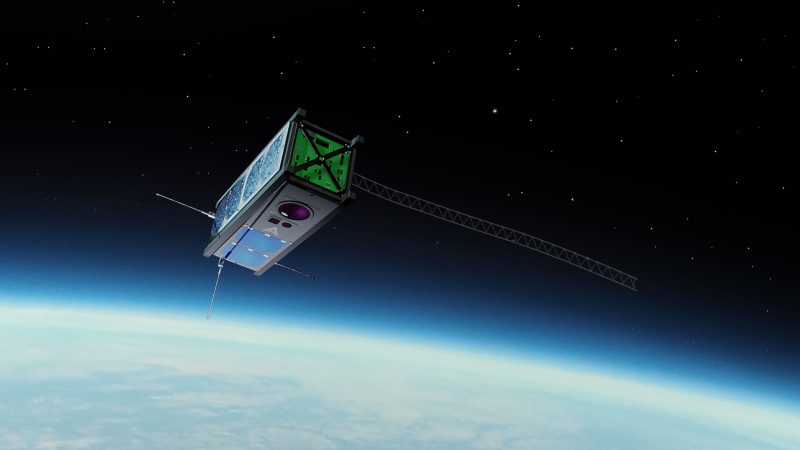SBI sp. z o. o.
Wilczyńskiego 25 E lok 124
10-686 Olsztyn
Poland
Finnish start-up Aurora powers the small satellite sector
The explosive growth of small and micro satellites is fuelling a burgeoning miniature spacecraft subsystem industry. Among those successfully fulfilling this need is start-up Aurora Propulsion Technologies, currently based at ESA’s Business Incubation Centre at Espoo in Finland where it is pioneering vital new component designs.
The boom in small satellites is being made possible by the ready availability of components such as modular satellite frames, on-board computers and power systems. Next in line now are the propulsion and attitude adjustment modules.
One of the pioneers in this micro propulsion and attitude control industry is Finnish start-up Aurora Propulsion Technologies. Aurora is an early entrant in the Finnish space ecosystem that is being driven by the national “New Space Economy” programme, placing it among a small group of companies that are responsible for the current buzz around space in Finland.

Riding the power-train
Aurora provides the whole power-train for satellites, from steering to engines and brakes. This includes attitude and orbit manoeuvring thrusters and multi-thruster modules, as well as their control systems. Aurora’s Plasma Brake modules can be used for the end-of-life deorbiting of a satellite, even if the satellite experiences a total system failure.
In future, the ambient plasma-based tether system used in the Plasma Brake will be developed into a solar electric sail, enabling interplanetary and deep-space missions for small – even cube – satellites, as they will have no need for any propellant.
Opening space to more businesses
The key requirements in the small satellite industry are low weight, small volume and low power consumption. These in combination enable smaller, lighter satellites to support bigger missions, all of which gives satellite builders better opportunities for access to space.
Both micro-thrusters and attitude and orbital control systems (AOCS), as supplied by Aurora, are crucial elements in enabling fast and cost-effective business missions to be performed using small satellites, right down to sub-cube size.
“Our customers are looking to use their satellites to prove or implement their business in space. Our ability to address their key needs and our mass-customisable platforms allow us to do it in a fraction of the time it took in the past,” says Aurora’s CEO Roope Takala.
Building a unicorn from tiny components
In start-up company incubation, companies that have the drive and a business idea to potentially grow into a 100 million euro business are referred to as unicorns. Since its launch, ESA BIC Finland has attracted a complementary and active group of potential unicorns into its incubator in Espoo. In a significant step towards that goal, Aurora has an In-Orbit-Demonstration (IoD) mission for its Plasma Brakes, thrusters and AOCS planned for December 2020. The Aurora team is now looking for partners to join the ride to the stars with them.
About ESA Space Solutions
ESA Space Solutions is the go-to-place for great business ideas involving space in all areas of society and economy. Our mission is to support entrepreneurs in Europe in the development of business using satellite applications and space technology to improve everyday life. Our programme is designed to provide multiple entry points such as ESA Business Incubation Centres (ESA BICs), ESA Technology Transfer Brokers, and the ESA Business Applications programme.
Funding typically ranges from 50KEuro to 2MEuro and supports everything from space technology transfer, early stage incubation programs, feasibility studies to large-scale demonstration projects.
ArViCom Sarl
20 Rue du Commerce Technoport Admin
3895 Foetz
Luxembourg
Terre d’Oltrepò
Via Sansaluto, 81
27043 Broni
Italy
ESA Space Solutions at the heart of the fight against COVID-19
The COVID-19 pandemic is causing widespread and varied issues in every country of the world. ESA has been successfully addressing some of the challenges caused by the COVID19 outbreak through various initiatives.
Initiatives for funding of projects to tackle COVID-19
ESA has promoted and encouraged the use of space technologies and know-how in healthcare and education for many years. In response to the global pandemic, ESA Business Applications as part of ESA Space Solutions has issued three initiatives in the healthcare and education domain to address the short-term emergency, while more are planned to support Industry in the path to COVID-19 recovery.
The first initiative issued in March was entitled “Space in Response to COVID-19 Outbreak” and invited companies to submit ideas for Demonstration Projects developing and piloting space-based applications. Issued in cooperation with the Italian Minister for Technological Innovation and Digitalization (MID), this initiative aimed to receive proposals offering concrete solutions to rapidly support the healthcare or education sectors which are heavily impacted by the nature of this sanitary crisis. Italy, which was the first European country to be significantly affected, will host trials with local users (e.g. hospital, general practitioners, schools). Despite a short deadline, more than 120 outline proposals were received and assessed. In total, companies from 16 countries responded to the call. The Italian Space Agency (ASI) offered a funding envelope of €10 million to support the best projects.
A second initiative was issued in mid-April based on the requirements of the National Health System (NHS) in the United Kingdom (UK). The UK Space Agency (UKSA) made available £2.6 million of funding for space-enabled solutions to strengthen the response to the pandemic of the UK’s NHS. This initiative invites companies to submit proposals for Demonstration Projects addressing NHS requirements and to be piloted with healthcare stakeholders in the UK. It is open for six months, until November 15th.
The third initiative is calling for Demonstration Projects focusing on pre-operational, space-based services in the healthcare and education sectors, to be demonstrated anywhere in Europe. Like for the other initiatives, the targeted services will be integrated and deployed quickly to alleviate the negative impacts caused by COVID-19, and help improve readiness for any future outbreaks. In this case, the initiative is open to organisations from any of the 22 Member States, with examples of possible applications described on the Space Based Services-Applications Addressing COVID-19 Outbreak web page. To know more about this funding call, please join the upcoming webinar scheduled for 15:00 CEST on 28 May 2020.
ESA-supported activities have a direct impact
Besides the dedicated initiatives mentioned above, some of the projects previously or currently funded by ESA Space Solutions making use of space assets have contributed to address the needs of the healthcare and other users communities to the COVID-19 outbreak.
In Italy, for example, ESA is funding a COVID-19 mission to the Piemonte region to perform health screening using B-LiFE, a transportable bio-lab developed with ESA support. This will help local health authorities to screen key actors (e.g. medical staff, blue forces, firefighters), remotely monitor the status of the pandemic and tailor treatments to individual patients. The B-LiFE lab (Biological Light Fieldable Laboratory for Emergencies) was developed by scientists at the University of Louvain in Belgium and successfully used during the Ebola outbreak in Guinea in 2014 to 2015.
In Spain, emergency responders are using two Tempus Pro telemedicine devices on loan from ESA to triage and treat patients in Barcelona. Originally developed as telemedicine devices for commercial airlines, the units were then upgraded to be used by medical professionals, for instance to support the work of Air Ambulances in the UK. ESA Business Applications supported all these demonstration projects. The devices are now being used by Catalonia’s emergency medical service to check vital parameters and transmit these to medical colleagues via phone or a secure satellite link for diagnosis.
Meanwhile, a French ultrasound system is proving its value in allowing imaging for remote diagnosis across a range of disciplines during the pandemic. The Melody system, designed by AdEchoTech with project and financial support from ESA (TESSA - Tele-Echography System for ESA), allows an assistant to hold the device against the patient and then the ultrasound expert, who may be located anywhere, can move the probe around in real-time using a joystick. This minimises the risk of contamination for everyone, particularly those who require isolation, and reduces the need to travel, alleviating the workload of imaging experts.
Apps prove their value during pandemic
Many apps on mobile devices have shown their positive impact especially for relieving the impact of isolation and supporting individual behaviour during this pandemic.
The Urban Sustainable Development Lab in the UK is currently carrying out a multi-city trial of its Care View app, co-funded by ESA Business Applications. The web app allows vetted public and third sector professionals to access a secure heatmap of their area showing streets (not individual houses) where external signs indicate seclusion or other unmet needs. The team is now offering a 4-months free subscription to a small number of cities for use during the pandemic.
The newest addition to the ESA-funded portfolio comes from Lanterne, a start-up company supported by ESA through the ESA Business Incubation Centre UK, which has devised a free app to help people observe social distancing. The Crowdless app, developed in just 3 days, uses satellite data and artificial intelligence to identify where people are congregating, allowing users to check whether their destination is becoming crowded and alter their plans accordingly.
Speed is of the essence
Lanterne isn’t the only company to move fast in response to the pandemic. From 9 to 12 April 2020, more than 12,000 people from over 100 countries took part in the Global Hack, organised by Garage48, a start-up hackathon series supported by ESA’s Business Incubation Centre in Estonia, which focused on ideas for the current crisis and ongoing resilience. The hackathon was won by SunCrafter, a German start-up that has repurposed solar cells to build a unit to disinfect hands.
ESA Space Solutions
ESA Space Solutions is the umbrella for ESA Business Applications, ESA Business Incubation and ESA Technology Brokers, and is a complete solution for newcomers, start-ups and industries to develop sustainable businesses and applications, and to utilise technologies from space for everyday life.
Please visit our website.
wer denkt was GmbH (appJobber.com)
Robert-Bosch-Str. 7
64293 Darmstadt
Germany



